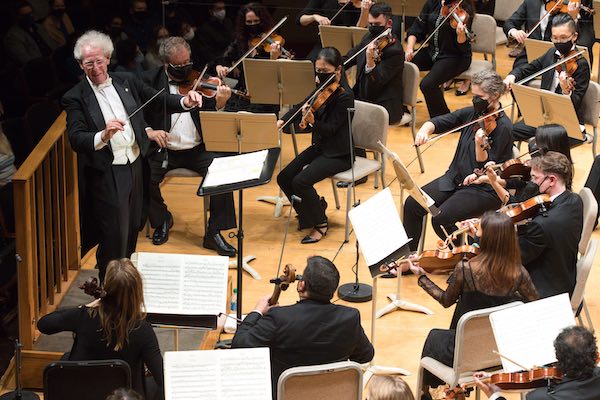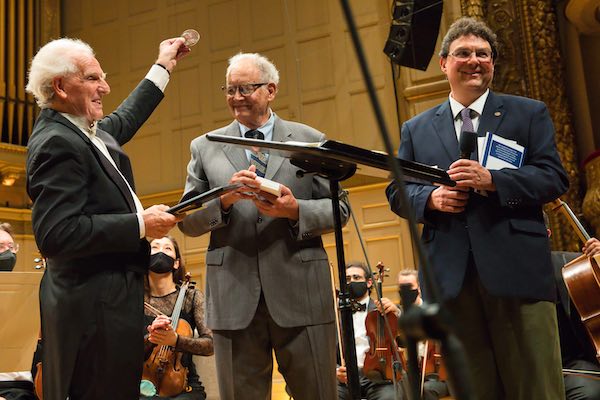Classical Concert Review: Boston Philharmonic Orchestra plays Bruckner’s Symphony No. 8
By Jonathan Blumhofer
This was an epic performance of an epic piece, steeped in Brucknerian character.

Benjamin Zander conducting the Boston Philharmonic Orchestra in a performance of Anton Bruckner’s Symphony no. 8 at Symphony Hall. Photo: Hilary Scott
The Boston Philharmonic Orchestra (BPO) and music director Benjamin Zander made a triumphant return to the stage on Friday night with a towering performance of Anton Bruckner’s Symphony no. 8 at Symphony Hall.
The choice of the Eighth was, perhaps, surprising — it’s Bruckner’s longest and most complex symphony, after all — but, especially given the orchestra’s 20-month hiatus, it was certainly fitting.
Rarely heard in Boston, this 1887 score (which was revised before its 1892 premiere) is essentially a study in chasmal contrasts of texture, sonority, and emotion that seem to suggest a struggle between belief and despair (or something similarly cosmic; Bruckner was a devout Roman Catholic). All of this is writ large over four movements that last roughly 84 minutes.
Despite its real demands of stamina, concentration, and interpretive prowess, in the right hands Bruckner’s Eighth stands as one of the most visionary, triumphant, and approachable works in the canon.
So it proved on Friday.
Zander is a longtime champion of the Austrian symphonist. Prior to the performance, in fact, he was presented with the Bruckner Society of America’s Julio Kilyeni Medal of Honor, an award previously given to Bruckner proselytizers such as Otto Klemperer, Bernard Haitink, Kurt Masur, and Herbert Blomstedt.
Heady company, that, but fully deserved — and more than vindicated just by the reading of the Eighth Zander subsequently drew from the BPO.
Throughout Friday’s performance, his command of the music’s structure was unerring: tempos always moved smartly, but the conductor knew just when to hold back for a moment to take in the view. What’s more, Zander was fully in tune with the spirit of the music and not once thrown by its sprawling architecture.
For its part, the BPO picked up right where it left off in February 2020: with playing of awesome purpose, vigor, and control. There was might and power to be had, and in spades (especially from the expanded brass section). But also delicacy — the woodwind flourishes in the middle of the finale were beautifully handled — and throughout an impressive elasticity and nimbleness to the ensemble’s phrasing.
Indeed, from the downbeat of the first movement, the orchestral performance was steeped in Brucknerian character. Portentous brass chorales gave way to delicate woodwind solos and tendrillar string tremolos. Textures were impressively lean — one could easily hear the play of triple against duple rhythms as well as the movement’s larger contrapuntal schemes unfolding — and the music’s contours were thoughtfully elucidated.
In the Scherzo, Zander and his forces whipped up a playful, romping storm. The BPO’s reading was strongly shaped and conspicuously vigorous in the movement’s outer thirds, while the extended Trio flowed warmly, highlighted by its handful of brief harp interjections (on Friday played by an expanded section of three harpists).
For the massive Adagio, Zander ably balanced the music’s coloristic and expressive demands. The string playing was fervent and devotional. Brasses were burnished, woodwinds sang radiantly. Everything was flawlessly blended and balanced.

Benjamin Zander receiving the Kilyeni Medal at Symphony Hall. Photo: Hilary Scott
Accordingly, the music’s expressive core burned bright. The movement’s introspective moments, like the recurring mystical sequence for strings and harps, glowed. Its climaxes were resplendent. What’s more, the Adagio’s transformational structure — it’s here that Bruckner really works out the music’s conflict between faith and doubt — came across clearly.
Meanwhile, the finale, which culminates in an affirmative resolution for the Symphony’s earlier materials and ideas, drove boldly. Remarkably, there was no letup in the intensity of the BPO’s playing. Quite the opposite: each new thematic gesture was imbued with a winsome sense of discovery. The triumphant coda blazed.
In the end, then, this was an epic performance of an epic piece.
The night’s large, preternaturally attentive audience — there was nary a cough during any of the Symphony’s several luftpausen — intuited this. They rewarded the BPO’s effort with the rowdiest ovation I’ve heard at Symphony Hall since it reopened for concerts in September: rarely has the Eighth’s hard-won sense of perseverance and achievement seemed to fit a moment and resonate with the public so potently as it did on Friday.
The Boston Philharmonic returns to Symphony Hall playing music by Mendelssohn, Prokofiev, and Brahms at 8 p.m. on November 10. bostonphil.org
Jonathan Blumhofer is a composer and violist who has been active in the greater Boston area since 2004. His music has received numerous awards and been performed by various ensembles, including the American Composers Orchestra, Kiev Philharmonic, Camerata Chicago, Xanthos Ensemble, and Juventas New Music Group. Since receiving his doctorate from Boston University in 2010, Jon has taught at Clark University, Worcester Polytechnic Institute, and online for the University of Phoenix, in addition to writing music criticism for the Worcester Telegram & Gazette.

I was present for the 8th. Maestro Zander and the BPO received three standing ovations. The play and execution were superb. I would recommend those of you who can go to the next performance — it’s Brahms 4th!
Brilliant stuff.